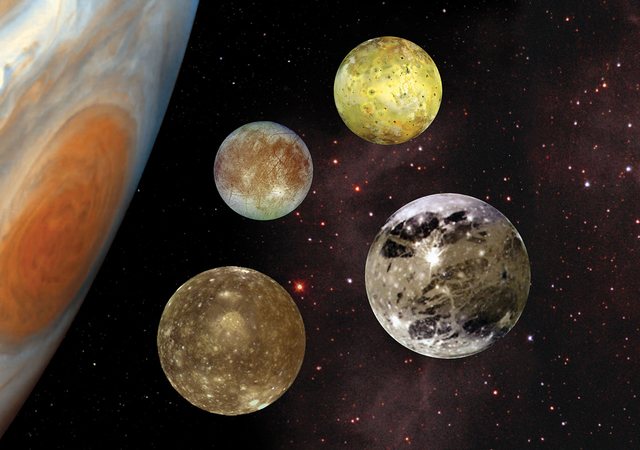
 Flash News
Flash News
Fire breaks out in a building in Astir
KAS rejected the request for a recount of votes, Alimehmeti sues the CEC in the Electoral College
Mahmut Orhan brings a unique experience with Curious X
Six police officers are sent to court, they did not impose fines even though they saw violations
Murder of Martin Cani/ 5 minors called to testify in Court, perpetrator denies charges
Space mission to Jupiter's icy moons postponed, mission aims to study oceans

The European Space Agency (ESA) has postponed a planned launch of a satellite to the planet Jupiter. Weather conditions indicated there was a risk of lightning on the mission, which aims to determine whether the planet's moons might be suitable for life.
ESA says it will try to launch the rocket again on Friday. The eight-year journey from Earth to reach Jupiter's main moons is one of the organization's most ambitious missions ever. There is evidence that these icy worlds of the moons – Callisto, Europa and Ganymede – harbor liquid water oceans in the depths. The project is known as the Jupiter Icy Moons Explorer, or Juice for short. Juice could help determine whether conditions in the moon's hidden oceans have at least a chance of supporting simple microbial organisms.
"In every extreme environment on Earth, whether it's high acidity, high radioactivity, low temperature, high temperature - we find microbial life in some form," Prof Carole Mundell, director of science at Esa, told BBC News. The €1.6 billion mission was scheduled to lift off Thursday on an Ariane-5 rocket from Kourou, French Guiana, at 09:15 local time.
"Arian" does not have the energy to send "Juice" directly to Jupiter. It will send the spacecraft around the inner solar system. A series of flybys of Venus and Earth will then gravitationally carry the mission to its intended destination.
Arrival in the Jovian system is expected in July 2031. Juice will make 35 close passes of the moons – coming within 400 km of their surfaces on occasion – before settling into orbit around Ganymede. The spacecraft carries a total of 10 instruments. It has various cameras, particle detectors, a radar to map features below the surface; there is also a lidar, which is used to make 3D maps of the surface terrain. But it is the magnetometer provided by the UK that may provide some of the most impactful data. The experiment built by Imperial College London will tell us about the properties of the moons' hidden oceans. And on Ganymede, in particular, the information should be quite detailed.
"We will know the depth of the ocean, its salt content, how deep the crust is above the ocean and whether the ocean is in contact with the rocky mantle. "So we will understand the internal structure of the moon, and from observations from other instruments looking at the surface, we will be able to work out whether there is organic material on that surface," explained Prof Michele Dougherty, principal investigator of the Imperial magnetometer. .
Latest news




Convinced DP candidate: Tirana district is opening, MPs' order changes
2025-06-02 21:42:53


Cara: At the head of the state is a party that was not voted for by Albanians
2025-06-02 21:16:53
The constitution of the Kosovo Assembly fails for the 25th time
2025-06-02 21:10:46
"130 thousand unused ballots", CEC responds to the DP
2025-06-02 20:51:02
Italian professor who insulted Giorgia Meloni's daughter attempts suicide
2025-06-02 20:25:21
Fire breaks out in a building in Astir
2025-06-02 20:22:46




Two women threaten the Saranda prosecutor in her office
2025-06-02 19:09:20
Etna wakes up again, the most active volcano in Europe erupts
2025-06-02 19:00:36







Fire reactivates in Darëzeza forest, firefighting efforts impossible
2025-06-02 17:28:29

Cultivating cannabis on a plot, 35-year-old arrested in Mirdita
2025-06-02 16:59:27

Switzerland/ Albanian caught with drugs worth over 1 million euros
2025-06-02 16:50:38
Kosovo-Serbia dialogue meetings resume in Brussels
2025-06-02 16:32:44
The VPN Era in Albania: How the TikTok Ban is "Failing", Video Views Increase
2025-06-02 16:26:36
Mahmut Orhan brings a unique experience with Curious X
2025-06-02 16:19:55

Businesses "forgot" to pay for elections, liabilities reached 4.7 billion lek
2025-06-02 15:50:27
Photo/ Caught with cocaine, Albanian arrested in Britain
2025-06-02 15:31:12


He violently opposed police officers, 39-year-old arrested in Vlora
2025-06-02 15:04:28


DP demands Rusmal's expulsion from KAS, Logu: It is biased, Begaj's advisor
2025-06-02 14:37:24
Anemia is increasing in the population
2025-06-02 14:32:18


Fires in Darëzezë reactivate, wind spreads flames
2025-06-02 13:57:33

Traffic jams and over 14 thousand fines, Traffic Police take stock of the week
2025-06-02 13:40:51
Eurosceptic Nawrocki wins presidential election in Poland
2025-06-02 13:33:27

Hysaj: Against Serbia with calm and courage, this match is for national pride
2025-06-02 13:14:41

Bulgaria defies chaos and continues on path to euro
2025-06-02 12:53:28


Elected MP, Tedi Blushi resigns from Tirana Municipal Council
2025-06-02 12:29:36

Murder in Tale, the author of the execution of Pjetër Kazaj is identified
2025-06-02 12:07:27


'Justice for Hamid': Activists protest against Gjadri camp
2025-06-02 11:41:26
The draw is made, judge Elsa Ulliri will judge the "Partizani" case
2025-06-02 11:26:52
The 25th attempt to constitute the Kosovo Assembly also fails
2025-06-02 11:12:29





Coefficients, how calculations are made for newly retired people
2025-06-02 10:11:17
Two vehicles burned in Maliq, arson suspected
2025-06-02 10:00:03

Logu: They deny us transparency about the May 11th farce!
2025-06-02 09:44:46
Ten ways to feel energized if even coffee doesn't work for you
2025-06-02 09:33:49
I shpallur në kërkim për llogari të Kosovës, arrestohet i riu nga Tepelena
2025-06-02 09:24:39
African heat wave begins in Albania, meteorology warns of dry summer
2025-06-02 09:11:48
Foreign exchange, how much foreign currencies are sold and bought today
2025-06-02 09:02:45
Truck catches fire on 'Rruga e Kombit', driver escapes
2025-06-02 08:56:21
On the May 11 electoral farce in Albania
2025-06-02 08:47:54

Priest Kristaq Vaso dies after falling from church roof in Korça
2025-06-02 08:32:29

Horoscope, what do the stars have in store for you today?
2025-06-02 08:10:47
Stable weather across the country, weather forecast
2025-06-02 07:59:25
Morning Post/ In 2 lines: What mattered yesterday in Albania
2025-06-02 07:46:43
Official, Juventus appoints Damien Comolli as general director
2025-06-01 21:57:45
"Russia could attack NATO in the next 4 years," warns German defense chief
2025-06-01 21:34:42
Kuçana: Opposition candidates have been threatened by "Rama's gangs in Shkozet"
2025-06-01 21:11:15


15-year-old injured in shooting at Ali Demi's pizzeria, details from police
2025-06-01 19:51:19

Russia accuses Ukraine of 'terrorist attack' on air bases
2025-06-01 18:57:24
A hospital in Hamburg, Germany, catches fire, killing three patients
2025-06-01 18:32:28
Nesho: Rama's autocratic regime has not allowed free elections to take place
2025-06-01 18:10:23
Moroccan immigrant's suicide, activist: There are inhumane conditions in Gjadra
2025-06-01 17:49:32
World Bank Report, PL: Confirms that the majority of Albanians live in poverty
2025-06-01 17:23:56

31 dead after Israeli attack near Gaza aid center
2025-06-01 16:40:30
At least 150 dead in Nigeria floods
2025-06-01 16:14:26
Flames engulf the Darëzeza forest massif in Fier
2025-06-01 15:56:41
